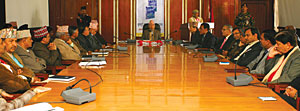 SHRUTI SHRESTHA/KANTIPUR |
"Leave the post if you cannot work,'' said Prime Minister Madhav Kumar Nepal to ministry secretaries at a function in Kathmandu recently. The PM told officials to report to him if they faced any political pressure, and encouraged them not to succumb to pressure. On the same day, SP Ramesh Kharel took a month's leave and Shankar Prasad Koirala, Secretary at the Ministry of Energy, got transferred. Both were known for their excellent execution of their responsibilities.
Kathmandu locals have appreciated Kharel's efforts to curb crime, while Koirala is highly regarded in the hydro sector. The PM has betrayed double standards by criticising high officials about their performance but penalising those who perform well. If those who perform well are not acknowledged, then only those performing badly will remain.
Politics and bureaucracy complement each other, but they have different modi operandi. Both should aim to make the country prosperous. Politics has the direct support of people (voters), which the administration does not have. The political leadership or ministers devolve power to the administration. The role of the bureaucracy or administration is thus important in delivering on promises that political parties make during the elections.
Politics is transient. Bureaucracy is more of a permanent government. It is the institutional memory of the government. The government cannot implement its policies and programs without the bureaucracy. Political parties reach out to the public through the bureaucracy, due to which there is a need for decentralisation. Politics is individual-centric while the bureaucracy is mechanism-centric.
The bureaucracy is not the place for elected representatives. It is not elected, but a collection of the selected. If the elected take pride in being elected, the selected are also proud of being selected for their capabilities and competencies. The real reason for conflict between politics and bureaucracy is their tendency to elevate their own importance. But they should understand that they need to complement each other to make things happen.
Harihar Sharma, Kathmandu
READ ALSO:
"A conservative mouthpiece"
Local hero
Water, please!
Fill the vacuum
Being small


